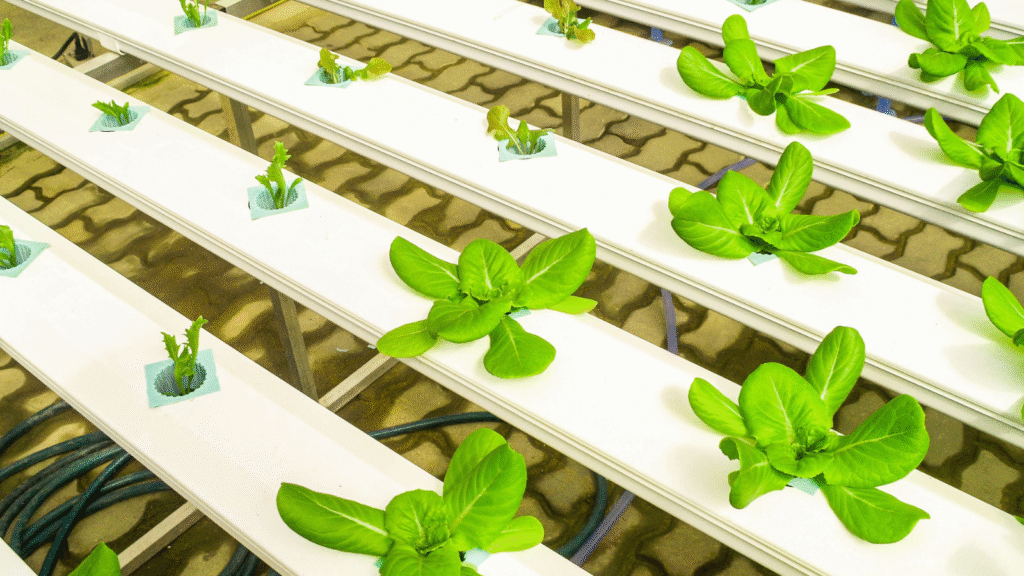Ninety-nine per cent of produce consumed in London comes from outside the M25, according to a report by the London Assembly’s Environment Committee earlier this year.
With limited space and high land costs, few see the capital as prime farming territory. Yet across the city, both established and innovative growers are producing fresh crops for Londoners.
Lea Valley – London’s Salad Bowl
North-east of the city lies the Lea Valley, dubbed the “Cucumber capital of Britain” and “London’s salad bowl”.
“The glasshouses of the Lea Valley were established in the 1850s to service Covent Garden Market as this was just a day’s horse-and-cart ride,” explains Lee Stiles, secretary of the Lea Valley Growers’ Association.
Straddling the London, Essex and Hertfordshire border along the River Lea, the valley’s 450 acres of glasshouses produce 80 million cucumbers a year – three-quarters of the UK crop – along with 100 million sweet peppers, 25 million aubergines and thousands of tonnes of vine tomatoes.
Around 70 growers belong to the association, several within Greater London. “Lea Valley produce can be packed on site and delivered to London overnight,” says Stiles.
In the 1950s, the valley boasted 1,100 acres of glasshouses – the largest concentration in the world – before many sites were lost to housing and industry. Despite this, Stiles calls it “an essential location”, adding: “Growing food near to London is not only beneficial for food security, shelf life, produce quality and reducing food waste, it also means that food miles, environmental and social impacts, are lower than importing from countries with water scarcity and poor working conditions.”
Harvest London – Vertical Farming in the City
A newer addition to the city’s food production is Harvest London, founded in 2017 in a lock-up above a garage. Using vertical farming – stacking crops indoors under controlled light, temperature, water and humidity – it grows produce for restaurants and food services.
“We grow all the year around, we don’t use pesticides, everything is super-local so there’s no air miles, it lasts for ages, it’s really clean and we’re super-consistent,” says co-founder Matt Chlebek.
“The reason why we are where we are is because we can harvest something and it’s in the kitchens three to four hours later, every day, without fail.”
Success led to a larger site in Lea Bridge and a second at Corner Corner, a new venue in Canada Water. While the team has trialled “everything from carrots to radishes, to aubergines”, they now focus on salad and herbs – with every square metre sold out.
“Someone’s got to do it and there’s demand,” says Chlebek. “Our job is to bring that growing back into the UK and back closer to where it comes from.”
Rooftop Farm Wimbledon
South-west London has its own unconventional farm atop Wimbledon Quarter, formerly Centre Court shopping centre. During redevelopment, an unused roof became the Rooftop Farm Wimbledon, now producing courgettes, lettuce, kale, oyster mushrooms, honey and more.
Ned Wainwright, who helps manage the site, says it began with recycling coffee grounds from local businesses to grow mushrooms. Now, crops are grown in old shopping crates, with apiaries housing 180,000 bees.
Produce is sold to local restaurants, via a café in Wimbledon Quarter, and through a monthly subscription box.
Using a rooftop has challenges. “Some veg loves the micro climate and some doesn’t so much,” Wainwright notes. But the project is also about education: “The idea is to kind of teach the local community what they could do and try and inspire them.”
Why Urban Farming Matters
For Liz Tree, a former young farmer ambassador for the National Farmers’ Union (NFU), such projects are vital.
“It is a big contribution to the economy – farming and the whole food supply chain – and it always surprises me that people don’t take it a bit more seriously,” she says. “Food miles is definitely a massive, massive thing that I think people don’t necessarily understand.”
Tree, who grew up in Croydon with no farming background, discovered agriculture by chance while on holiday in the Brecon Beacons. She now works in the agri-tech sector, runs a smallholding in South Wales, and supports NFU education programmes.
“We have a programme called Farmers for Schools… and sometimes it can be quite shocking at the lack of understanding that kids have about even the things that we can physically grow in this country,” she says.
Her advice is for everyone to try growing something: “Anyone that has any kind of garden, or you know a window that you could put a window box on or something, should be experimenting growing something… It’s so satisfying to see things that you’ve grown yourself.”
This mix of historic glasshouses, high-tech vertical farms, and creative rooftop plots shows that even in one of the world’s busiest cities, agriculture can thrive – and bring food closer to the plates of those who eat it.


